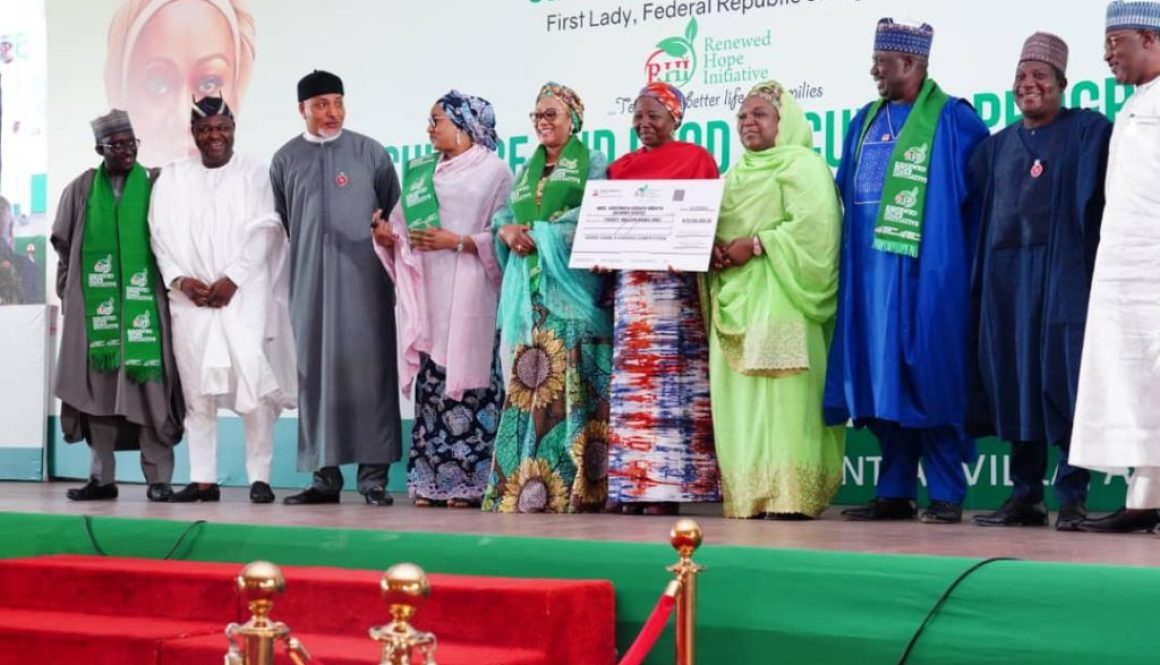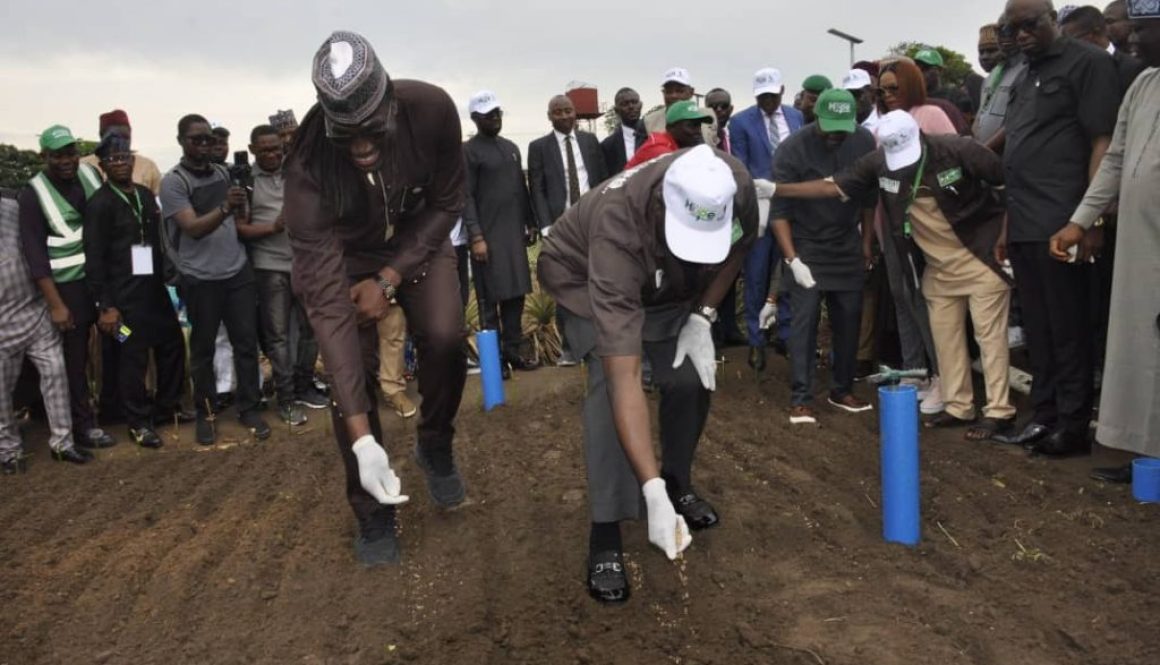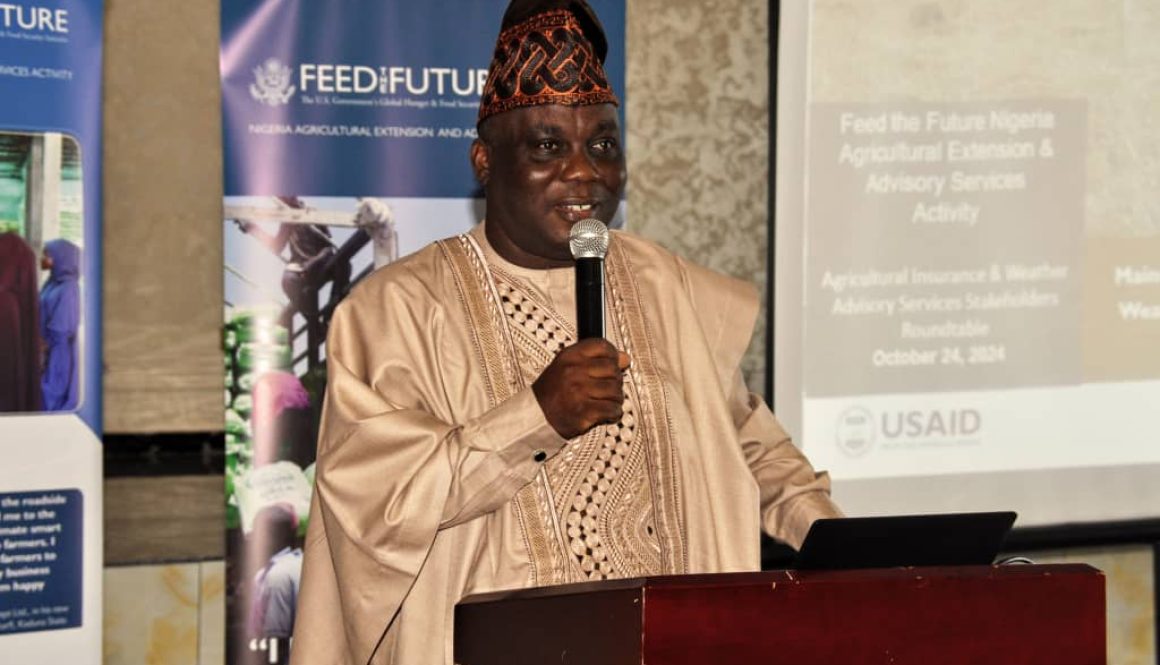46TH REGULAR MEETING OF THE NATIONAL COUNCIL ON AGRICULTURE AND FOOD SECURITY (NCAFS) HELD AT THE INTERNATIONAL CONVENTION CENTRE, CALABAR, CROSS RIVER STATE, FROM 11TH TO 15TH NOVEMBER, 2024
COMMUNIQUE
The 46th Regular Meeting of the National Council on Agriculture and Food Security (NCAFS), with the theme “Resilience to Climate Change Towards Sustainable Food Security”, was held at the International Convention Centre, Calabar, Cross River State, from 11th – 15th November, 2024, under the chairmanship of the Honourable Minister of Agriculture and Food Security, Sen. Abubakar Kyari, CON.
The meeting was preceded by the Technical Meeting of Officials held on 11th and 12th November, 2024, under the chairmanship of the Permanent Secretary, Federal Ministry of Agriculture and Food Security, Mr. Temitope Fashedemi, fnim. The Officials Meeting considered a lead paper titled “Contextual Issues and Solutions to Nigeria’s Resilience to Climate Change towards Sustainable Food Security” presented by Mr. Azubuike Nwokoye, a Food Systems Specialist with ActionAid Nigeria. An overview of the Greener Hope Large Scale Farm Mechanization Programme of the Federal Government was also presented to Council. The Representative of Youth in Agriculture, Mr. Tobi Jerry Olanrewaju, made presentation on “Leveraging Youth Power to Build Resilient Sustainable and Food- Secure Future in Nigeria”.
The Council Meeting, held on Thursday, 14th November, 2024, was presided over by the Honourable Minister and supported by the Honourable Minister of State, Sen. Dr. Sabi Aliyu Abdullahi CON. Other dignitaries were the Honourable Commissioners of Agriculture from the 36 States of the Federation and their counterpart from the Federal Capital Territory.
Participants included National Assembly members, Federal and State Ministries of Agriculture, Departments and Agencies, Organized Private Sector, Representatives of All Farmers Association of Nigeria, Women Organizations, Seeds and Fertilizer Companies, Agro-Input Dealers, Non-Governmental Organizations, Civil Society Organizations, Federation of Agricultural Commodity Association of Nigeria, Association of Deans of Faculty of Agriculture in Nigerian as well as virtual participants.
The Permanent Secretary, Federal Ministry of Agriculture and Food Security, Mr. Temitope Fashedemi, fnim delivered the Welcome Address at the opening session. The Secretary to the Cross River State Government, Prof. Anthony Owan Enoh also presented a goodwill message on behalf of Cross River State.
Messages were also delivered by the Agriculture Advisor, Nigeria Governors’ Forum (NGF), Prof. Abba Gambo, the Chairman, House Committee on Agricultural Production & Services, Hon. Bello Kaoje, represented by the Deputy Chairman, Hon. Kelechi Nworgu, and the Country Programme Manager, International Food Policy Research Institute (IFPRI), Dr. Hyacinth Ede.
Other messages were from the representatives of the Small Scale Women Farmers Association of Nigeria (SWOFON), Mrs. Rachael Ruppee, and the Donor Working Group, Mr. Azubuike Nwokoye, a Food Systems Transformation Specialist, Action Aid.
The Honourable Minister delivered the Keynote Address while the Executive Governor, Cross River State, His Excellency, Sen. Prince Bassey Edet Otu represented by the Deputy Governor, His Excellency, Rt. Hon. Peter Odey, Ph.D gave an address and formally declared the meeting open. The Vote of thanks was delivered by the Honourable Minister of State.
The Meeting considered Thirty-Five (35) substantive memoranda, Six (6) administrative memoranda and noted Twenty (20) information memoranda. Two (2) memoranda were withdrawn. A total of 925 participants attended the 46th NCAFS meeting both physically and virtually.
Council acknowledged:
The support and partnership of the Government of Cross River State for the successful hosting of the 46th NCAFS Meeting in Calabar, the State Capital;
The role of Federal, State and Local Governments in addressing the prevailing challenges of climate change and food inflation underscored the need for synergy among stakeholders towards sustainable food security in Nigeria;
The efforts of the Administration of His Excellency, Bola Ahmed Tinubu, GCFR, President and Commander-in-Chief of the Armed Forces, Federal Republic of Nigeria, over the declaration of a State of Emergency in the Agriculture sector, towards achieving food and nutritional security;
Contributions of Nigerian farmers to sustainable agricultural development in Nigeria in spite of the diverse challenges facing the sector especially as the farmers remained resolute and resilient in their quest for food and nutritional security in the country; and
The need for decisions relating to the newly created Federal Ministry of Livestock Development to be captured in the transition document;
11.0 Council approved as follows:
The formation, participation and funding of specialized cooperatives for the implementation of leather processing, other value chains and export programme across the country;
The need for establishment of a National Prevention and Control programme for Brucellosis for a coordinated and strategic approach towards prevention and control of Brucellosis in Nigeria;
The incorporation of Rodent Control and Eradication of Rodents in Nigeria into the integrated National Pest Management Programme;
Revitalisation of Agricultural Extension and Advisory Services Delivery system in Nigeria using the Agricultural Development Project (ADP) approach;
Strengthening the synergy among MDAs, stakeholders and other tiers of Government towards full implementation of Buffer Food Reserve to enhance food security;
The development of a comprehensive National Action Plan on Meat Transportation (NAPMT) in Nigeria to align with international best practices and its transmission to the new Federal Ministry of Livestock Development for implementation;
Establishment of a National Aquatic Animal Disease Diagnostic Centre in the six geo-political zones of the country for implementation by the Federal Ministry of Livestock Development in collaboration with the Federal Ministry of Marine and Blue Economy;
Enactment of a policy encouraging the employment of Veterinary Doctors by the 774 Local Government Councils to support the implementation of One Health (OH), surveillance of transboundary animal diseases, and monitoring of zoonotic diseases across the country;
Establishment of reference Fertilizer and Agrochemical Laboratories in Abuja and the six (6) Regional Laboratories as a medium for the implementation of National Fertilizer Quality Control and Regulatory System for Nigeria with a robust enforcement mechanism;
Facilitation of the increment of the Central Bank of Nigeria (CBN) NIRSAL Credit Risk Guarantee (CRG) from 30% to 50% for plastic crates to incentivize investments; increase the availability of crates; reduce post-harvest losses, and ensure the safety of vegetables during transportation, thereby enhancing food and nutrition security; and
The need to revive the Cotton Value Chain in Zamfara and other Cotton producing States for job creation and revenue generation.
12.0 Council also approved:
Federal Government’s support to the States in agricultural development and the utilization of water bodies in line with President Bola Ahmed Tinubu’s Renewed Hope Agenda for food and nutritional security;
The provision of Special Intervention Funds for the development of Early Maturing Rubber Cultivars (EMRC) through advanced genetic improvement techniques to strengthen the Nigerian rubber industry for food security and investment opportunities.
The establishment of 30,000 hectares of rubber-based agroforestry plantation by 6,000 smallholders’ rubber farmers in 15 rubber growing States of Nigeria.
Strengthening the mainstreaming of gender into climate change adaptation and mitigation strategies for Persons with Disabilities (PWDs) in the six geo-political Zones in line with the National Gender Policy on Agriculture.
The conduct of stakeholders and implementation strategy workshop to complete the review of the National Fertilizer and Agro-chemical Policy for Nigeria and the formulation of a National Organic Agricultural policy.
Development of Tiger Nut Value Chain in Nigeria through its assignment to the National Root Crops Research Institute, Umudike.
The establishment of a new “Plant Health and Pest Control Services Department” in the Federal Ministry of Agriculture and Food Security to serve as a Desk for collaboration with relevant regulatory agencies in the formulation of policy and guidelines on crop health and pesticide usage.
The revitalization of the Competitive Agricultural Research Grant Scheme through provision of Special Intervention and other funding such as the National Agricultural Development Fund (NADF).
The establishment of Agricultural Technology Adoption Centres (ATACS) in the 36 States of the Federation and the Federal Capital Territory (FCT) and sates to make provision for building or land and a demonstration plot.
The implementation of the Tomato Policy for sustainable economic growth in the sub-sector.
Development of Compendium for Agro-Base Equipment Manufacturers and Fabricators as well as Agro Processors in Nigeria.
The implementation of the Nigerian Farmers’ Soil Health Card Scheme (NFSHCS) nationwide for improved climate resilience and food security.
The promotion of organic agriculture in Nigeria for economic enhancement of healthy food and nutritional security.
Institutionalization of insurance as a compulsory pillar for all government and donor-funded agricultural projects in Nigeria.
The promotion and implementation of all-year-round farming by encouraging the State Government to provide relevant irrigation infrastructure to augment the Federal Government’s efforts.
13.0 Council further approved:
Institutionalization and linkage of community-based seed entrepreneurs to appropriate National Agricultural Research System and Consultative Group of International Agricultural Research for sourcing of early generation seeds.
Development of a National Strategy for the utilization of residual moisture for cultivation of crops to mitigate flood-induced food insecurity.
The review of agriculture curriculum education to enhance climate resilience and be demand-driven, via collaboration with the National Universities Commission (NUC) which has the mandate for implementation.
Agricultural Research Council of Nigeria to take proactive measures to ensure that National Agricultural Research Institutes (NARIS) reactivate their out-stations in collaboration with the States and members of the Legislatures in their locations with a view to improving agricultural productivity and knowledge on new technologies and innovations amongst the rural farming communities.
The establishment of a task force on wildlife trade to mitigate the illegal trade on wildlife animals and handed over to Federal Ministry of Livestock Development and recommend same to the Federal Ministry of Environment.
Establishment of centers for breeding of heat/disease resistant breeds of poultry and handed over to Federal Ministry of Livestock Development.
Prioritization of investments in postharvest infrastructure by governments at all levels and through public-private partnership.
Approve more funds for the Department of Rural Development from the National Agricultural Development Fund (NADF) to execute rural infrastructure projects across all the rural communities nationwide.
14.0. Council unanimously resolved that the 47th NCAFS Meeting will hold in Kaduna State.
This day: 14th November, 2024
Calabar International Convention Centre,
Calabar,
Cross River State.

















